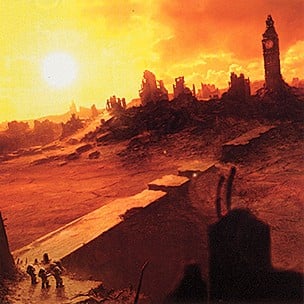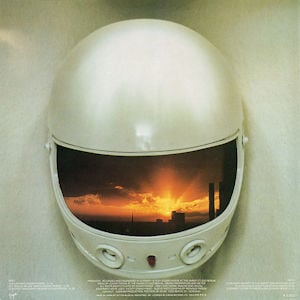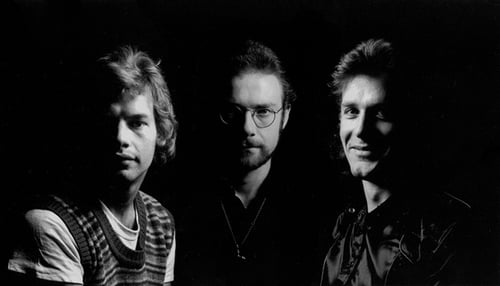| Author |
 Topic Search Topic Search  Topic Options Topic Options
|
Roland113 
Special Collaborator


Honorary Collaborator
Joined: March 30 2008
Location: Pittsburgh, PA
Status: Offline
Points: 3841
|
 Topic: Did Genesis release the first neo-prog album? Topic: Did Genesis release the first neo-prog album?
Posted: December 02 2014 at 16:19 |
 SteveG wrote: SteveG wrote:
^No problem man. I must say that when I hear the term 'traditional instruments', violins and horns do pop into my head. But for a southern friend of mine, fiddles and banjos pop into his!  |
LOL, point taken, tradition is a relative term.
|
|
-------someone please tell him to delete this line, he looks like a noob-------
I don't have an unnatural obsession with Disney Princesses, I have a fourteen year old daughter and coping mechanisms.
|
 |
SteveG 
Forum Senior Member


Joined: April 11 2014
Location: Kyiv In Spirit
Status: Offline
Points: 20503
|
 Posted: December 02 2014 at 16:08 Posted: December 02 2014 at 16:08 |
^No problem man. I must say that when I hear the term 'traditional instruments', violins and horns do pop into my head. But for a southern friend of mine, fiddles and banjos pop into his! 
|
|
This message was brought to you by a proud supporter of the Deep State.
|
 |
Roland113 
Special Collaborator


Honorary Collaborator
Joined: March 30 2008
Location: Pittsburgh, PA
Status: Offline
Points: 3841
|
 Posted: December 02 2014 at 15:51 Posted: December 02 2014 at 15:51 |
 SteveG wrote: SteveG wrote:
^I would have to say, Logon, that Roland's overview was excellent.
I don't feel that he is partly responsible for the term Neo Prog unless he coined the term in the early 90's.
The point I beg to differ is on Symphonic Prog being played by orchestral instruments. When I listen to And You And I by Yes, I hear a symphony conjured up by mellotrons and synths, courtesy of Messer's Wakeman and associates. So, Symphonic Prog was already electric prior to the 80's neo craze, IMHO.
I'm aware that this is an age old debate, argument or what ever people care to call it.
To me, it's just old now, and I would like to see the term modernized for the 21st century.
Shalom. |
Thanks Steve, I don't feel that Logan was blaming me personally or even expressing that sentiment.
Also, to further clarify, I'm not saying that Symphonic wasn't electric. The Melotron and the Organ are very prevalent in symphonic prog. My point is that those two sounds, in particular, are much rarer in the Neo genre, a lot of time they are replaced by the more modern digital keyboard patches from the FM symthesis era.
In my mind I had included the Melotron and Organ as 'traditional instruments' though I can see how that could be a little misleading.
Edited by Roland113 - December 02 2014 at 15:54
|
|
-------someone please tell him to delete this line, he looks like a noob-------
I don't have an unnatural obsession with Disney Princesses, I have a fourteen year old daughter and coping mechanisms.
|
 |
Roland113 
Special Collaborator


Honorary Collaborator
Joined: March 30 2008
Location: Pittsburgh, PA
Status: Offline
Points: 3841
|
 Posted: December 02 2014 at 15:42 Posted: December 02 2014 at 15:42 |
 Logan wrote: Logan wrote:
Excellent post, Roland. Very informative for someone such as myself with relatively little exposure to Neo-Prog.
Treat this as another one of my rambling asides:
Perhaps a better term could be thought of to encompass all the music that we put under the Neo-Prog umbrella, but I believe the term is still relevant. For me it refers to a particular Prog revival movement and its followers that share genre similarities. The question becomes, to me, whether that term should extend beyond the initial "movement" if one want to call it that.
People still use the term classical to refer to a wide variety of western academic music, including modern music, despite the fact that it also refers to a specific period. Avant-garde artists of the past centuries are still called avant-garde even though they are no longer at the vanguard of arts. And we still call music avant-garde that draws its inspiration from much earlier avant-garde artists. A lot of music called avant-garde these days is really not avant-garde as it does what has already been done (draws on the past). Rock in Opposition was a particular movement of a particular time, yet bands that were not part of the festivals were included in it (of course there were later festivals) and is often used, wrongly quite often I'dd say, for experimental bands that share little in common with the aims of the RIO movement.
True Neo-Prog may have had its day, but its still a term that people are familiar with and can use both historically and for bands that draw on that music for inspiration. |
Thanks Logan and well said yourself.
I agree, it isn't the best of names, any title with the word 'new' (or Neo as the case may be) is setting itself up for failure. If the movement or title has any sticking power, it will inherently become old one day. I like Techno-Symphonic if you'd like, Synthonic if you're feeling particularily whimsical.
But, like you're suggesting for RIO and Avant-Garde, the name has stuck far beyond the initial movement. Trying to go back and change the name, as flawed as it may be, is really an excersize in futility and would require far more work than the good it would net. I agree with your conclusion completely.
|
|
-------someone please tell him to delete this line, he looks like a noob-------
I don't have an unnatural obsession with Disney Princesses, I have a fourteen year old daughter and coping mechanisms.
|
 |
SteveG 
Forum Senior Member


Joined: April 11 2014
Location: Kyiv In Spirit
Status: Offline
Points: 20503
|
 Posted: December 02 2014 at 15:37 Posted: December 02 2014 at 15:37 |
^I would have to say, Logon, that Roland's overview was excellent. I don't feel that he is partly responsible for the term Neo Prog unless he coined the term in the early 90's. The point I beg to differ is on Symphonic Prog being played by orchestral instruments. When I listen to And You And I by Yes, I hear a symphony conjured up by mellotrons and synths, courtesy of Messer's Wakeman and associates. So, Symphonic Prog was already electric prior to the 80's neo craze, IMHO. I'm aware that this is an age old debate, argument or what ever people care to call it. To me, it's just old now, and I would like to see the term modernized for the 21st century. Shalom.
Edited by SteveG - December 02 2014 at 15:41
|
 |
Logan 
Forum & Site Admin Group


Site Admin
Joined: April 05 2006
Location: @ wicker man
Status: Offline
Points: 32698
|
 Posted: December 02 2014 at 15:17 Posted: December 02 2014 at 15:17 |
 SteveG wrote: SteveG wrote:
 Roland113 wrote: Roland113 wrote:
I feel the absurd need to weigh in here if for no other reason than I'm partially responsible for characterizing bands as 'Neo Prog' or 'not Neo Prog'.
Neo started out as a reference to the 80's revival bands, Marillion, IQ, Pendragon and to a lesser extent Twelfth Night. Initially it was similar to Canterbury in that it was specific to a time and a place. But then it morphed.
Marillion specifically took a drastic turn from the bombastic style of the Fish Era to the sweeping atmoshpere of the Hogarth Era. Pendragon grew into a much heavier sound as they moved forwards, IQ has continued to grow in intensity and production throughout the years. As the three prototypical bands changed their sounds and continued to stay on the edge of technology, the definition of Neo morphed along with the bands.
The main differences between Neo and Symphonic these days is in the instrumentation. While modern Symphonic still has a big focus on traditional instruments and sounds, Neo focuses much more on the progression of technology. In Neo, most of the Melotrons, the organs and the flutes have been replaced by the synth. The 12 strings and accoustic pickings have been mostly been replaced by flanged or delayed guitar effects.
To sum, Neo is very much a subset of the Symphonic genre without the constraints of the traditional instrumentation.
Obviously, this is all subject to opinion, but the first real Neo album was "Script for a Jester's Tear" because that was pretty much the first album that made people start thinking 'whoa, we need a name for this'. |
'Whoa, we need a new name for this.' How about Neo-Symphonic as Dr. Wu alluded to in his last post. I think the term neo-prog has had it's day. All who agree, say aye.
|
Excellent post, Roland. Very informative for someone such as myself with relatively little exposure to Neo-Prog. Treat this as another one of my rambling asides: Perhaps a better term could be thought of to encompass all the music that we put under the Neo-Prog umbrella, but I believe the term is still relevant. For me it refers to a particular Prog revival movement and its followers that share genre similarities. The question becomes, to me, whether that term should extend beyond the initial "movement" if one want to call it that. People still use the term classical to refer to a wide variety of western academic music, including modern music, despite the fact that it also refers to a specific period. Avant-garde artists of the past centuries are still called avant-garde even though they are no longer at the vanguard of arts. And we still call music avant-garde that draws its inspiration from much earlier avant-garde artists. A lot of music called avant-garde these days is really not avant-garde as it does what has already been done (draws on the past). Rock in Opposition was a particular movement of a particular time, yet bands that were not part of the festivals were included in it (of course there were later festivals) and is often used, wrongly quite often I'dd say, for experimental bands that share little in common with the aims of the RIO movement. True Neo-Prog may have had its day, but its still a term that people are familiar with and can use both historically and for bands that draw on that music for inspiration.
|
 |
SteveG 
Forum Senior Member


Joined: April 11 2014
Location: Kyiv In Spirit
Status: Offline
Points: 20503
|
 Posted: December 02 2014 at 14:49 Posted: December 02 2014 at 14:49 |
|
^This thread is just fine as it was responsible for this debate.
|
 |
Walton Street 
Forum Senior Member


Joined: November 24 2014
Location: Canada
Status: Offline
Points: 872
|
 Posted: December 02 2014 at 14:47 Posted: December 02 2014 at 14:47 |
or you need a new thread: Did Genesis Release the First Genesis Album? :)
|
|
"I know one thing: that I know nothing"
- SpongeBob Socrates
|
 |
SteveG 
Forum Senior Member


Joined: April 11 2014
Location: Kyiv In Spirit
Status: Offline
Points: 20503
|
 Posted: December 02 2014 at 14:45 Posted: December 02 2014 at 14:45 |
 Roland113 wrote: Roland113 wrote:
I feel the absurd need to weigh in here if for no other reason than I'm partially responsible for characterizing bands as 'Neo Prog' or 'not Neo Prog'.
Neo started out as a reference to the 80's revival bands, Marillion, IQ, Pendragon and to a lesser extent Twelfth Night. Initially it was similar to Canterbury in that it was specific to a time and a place. But then it morphed.
Marillion specifically took a drastic turn from the bombastic style of the Fish Era to the sweeping atmoshpere of the Hogarth Era. Pendragon grew into a much heavier sound as they moved forwards, IQ has continued to grow in intensity and production throughout the years. As the three prototypical bands changed their sounds and continued to stay on the edge of technology, the definition of Neo morphed along with the bands.
The main differences between Neo and Symphonic these days is in the instrumentation. While modern Symphonic still has a big focus on traditional instruments and sounds, Neo focuses much more on the progression of technology. In Neo, most of the Melotrons, the organs and the flutes have been replaced by the synth. The 12 strings and accoustic pickings have been mostly been replaced by flanged or delayed guitar effects.
To sum, Neo is very much a subset of the Symphonic genre without the constraints of the traditional instrumentation.
Obviously, this is all subject to opinion, but the first real Neo album was "Script for a Jester's Tear" because that was pretty much the first album that made people start thinking 'whoa, we need a name for this'. |
'Whoa, we need a new name for this.' How about Neo-Symphonic as Dr. Wu alluded to in his last post. I think the term neo-prog has had it's day. All who agree, say aye.
Edited by SteveG - December 02 2014 at 14:59
|
 |
richardh 
Prog Reviewer


Joined: February 18 2004
Location: United Kingdom
Status: Offline
Points: 26171
|
 Posted: December 02 2014 at 13:32 Posted: December 02 2014 at 13:32 |
 Roland113 wrote: Roland113 wrote:
I feel the absurd need to weigh in here if for no other reason than I'm partially responsible for characterizing bands as 'Neo Prog' or 'not Neo Prog'.
Neo started out as a reference to the 80's revival bands, Marillion, IQ, Pendragon and to a lesser extent Twelfth Night. Initially it was similar to Canterbury in that it was specific to a time and a place. But then it morphed.
Marillion specifically took a drastic turn from the bombastic style of the Fish Era to the sweeping atmoshpere of the Hogarth Era. Pendragon grew into a much heavier sound as they moved forwards, IQ has continued to grow in intensity and production throughout the years. As the three prototypical bands changed their sounds and continued to stay on the edge of technology, the definition of Neo morphed along with the bands.
The main differences between Neo and Symphonic these days is in the instrumentation. While modern Symphonic still has a big focus on traditional instruments and sounds, Neo focuses much more on the progression of technology. In Neo, most of the Melotrons, the organs and the flutes have been replaced by the synth. The 12 strings and accoustic pickings have been mostly been replaced by flanged or delayed guitar effects.
To sum, Neo is very much a subset of the Symphonic genre without the constraints of the traditional instrumentation.
Obviously, this is all subject to opinion, but the first real Neo album was "Script for a Jester's Tear" because that was pretty much the first album that made people start thinking 'whoa, we need a name for this'. |
nice read that 
|
 |
M27Barney 
Forum Senior Member


Joined: November 09 2006
Location: Swinton M27
Status: Offline
Points: 3136
|
 Posted: December 02 2014 at 12:15 Posted: December 02 2014 at 12:15 |
Aye and that name was Symphonic Progressive Rock - Phase II..... 
|
 |
Roland113 
Special Collaborator


Honorary Collaborator
Joined: March 30 2008
Location: Pittsburgh, PA
Status: Offline
Points: 3841
|
 Posted: December 02 2014 at 11:51 Posted: December 02 2014 at 11:51 |
I feel the absurd need to weigh in here if for no other reason than I'm partially responsible for characterizing bands as 'Neo Prog' or 'not Neo Prog'.
Neo started out as a reference to the 80's revival bands, Marillion, IQ, Pendragon and to a lesser extent Twelfth Night. Initially it was similar to Canterbury in that it was specific to a time and a place. But then it morphed.
Marillion specifically took a drastic turn from the bombastic style of the Fish Era to the sweeping atmoshpere of the Hogarth Era. Pendragon grew into a much heavier sound as they moved forwards, IQ has continued to grow in intensity and production throughout the years. As the three prototypical bands changed their sounds and continued to stay on the edge of technology, the definition of Neo morphed along with the bands.
The main differences between Neo and Symphonic these days is in the instrumentation. While modern Symphonic still has a big focus on traditional instruments and sounds, Neo focuses much more on the progression of technology. In Neo, most of the Melotrons, the organs and the flutes have been replaced by the synth. The 12 strings and accoustic pickings have been mostly been replaced by flanged or delayed guitar effects.
To sum, Neo is very much a subset of the Symphonic genre without the constraints of the traditional instrumentation.
Obviously, this is all subject to opinion, but the first real Neo album was "Script for a Jester's Tear" because that was pretty much the first album that made people start thinking 'whoa, we need a name for this'.
|
|
-------someone please tell him to delete this line, he looks like a noob-------
I don't have an unnatural obsession with Disney Princesses, I have a fourteen year old daughter and coping mechanisms.
|
 |
Tom Ozric 
Prog Reviewer


Joined: September 03 2005
Location: Olympus Mons
Status: Offline
Points: 15916
|
 Posted: December 02 2014 at 02:08 Posted: December 02 2014 at 02:08 |
|
For what it's worth, I think, having just listened, that Duke, was where this whole proto 'Neo' arrangement came into play......
|
 |
richardh 
Prog Reviewer


Joined: February 18 2004
Location: United Kingdom
Status: Offline
Points: 26171
|
 Posted: December 02 2014 at 01:36 Posted: December 02 2014 at 01:36 |
 verslibre wrote: verslibre wrote:
 richardh wrote: richardh wrote:
 SteveG wrote: SteveG wrote:
Sorry, but what has all of this discussion to do with the posted question? I'll state this fact again. Early neo-prog was based on groups influenced by Genesis, so how can Genesis possibly be considered neo-prog? This would be akin to asking if the philosophical school of Neo-Platonism was the first school of Platonism when the original school existed 500 years before. You simply cannot put the cart before the horse no matter how hard some member's try. Amazing.
|
If the question had been posed with quotation marks around 'neo prog' would that have been okay?
If we rule out Genesis can I rule in UK's debut album? That contained many of the elements of 'neo prog' ie pointing towards a new direction yet its not easy to pick up any direct influence in the neo prog scene. If not then they might qualify as a bridge between symph and neo at least. |
U.K. (just the first one) is kind of a unique animal thanks to Holdsworth. It has a symph/jazz split personality. I've never seen it compared or likened to neo-prog. What about Pallas' Arrive Alive? While it has several incarnations, its earliest issue was 1981. |
I'm not saying it has a direct link but I can hear elements of it pushing prog in a new direction and some of those elements such as the atmosphere that Jobson created on a track like Alaska seem relevant to neo prog.
I'm not well up on Pallas or Twelth Night although both were important to the early eighties prog scene.
|
 |
verslibre 
Forum Senior Member


Joined: July 01 2004
Location: CA
Status: Offline
Points: 15007
|
 Posted: December 01 2014 at 16:57 Posted: December 01 2014 at 16:57 |
 SteveG wrote: SteveG wrote:
Would it have been such a stretch for the eighties prog renaissance to have been simply called The 80's Prog Revival and left at that? |
I do like that the sound of that. Martin Orford has also argued there is no such thing as Neo-prog, or that if there is, everything from 1980 onward is Neo. Or something like that. I don't recall his exact wording.
|
|
|
 |
SteveG 
Forum Senior Member


Joined: April 11 2014
Location: Kyiv In Spirit
Status: Offline
Points: 20503
|
 Posted: December 01 2014 at 16:56 Posted: December 01 2014 at 16:56 |
 SteveG wrote: SteveG wrote:
 richardh wrote: richardh wrote:
[QUOTE=SteveG]
Sorry, but what has all of this discussion to do with the posted question? I'll state this fact again. Early neo-prog was based on groups influenced by Genesis, so how can Genesis possibly be considered neo-prog? This would be akin to asking if the philosophical school of Neo-Platonism was the first school of Platonism when the original school existed 500 years before. You simply cannot put the cart before the horse no matter how hard some member's try. Amazing.
|
If the question had been posed with quotation marks around 'neo prog' would that have been okay?
If we rule out Genesis can I rule in UK's debut album? That contained many of the elements of 'neo prog' ie pointing towards a new direction yet its not easy to pick up any direct influence in the neo prog scene. If not then they might qualify as a bridge between symph and neo at least. |
I can appreciate your intent Richard, but lets be real. A half dozen English bands in the mid eighties were not falling over themselves to produce UK style prog bands. Their fanaticism extended only to Genesis for reasons that are known only to God. Neo Prog has evolved from that original concept of Genesis worship and has gone on to include a myriad of newer added-on definitions, so that now it could almost be what you want it to be. In answer to your question, identifying this topic as 'neo prog' would not help as the fault lies long ago with those that conjured up the definitions of Neo Prog by identifying and associating the sub genre with musical groups (nee Genesis) instead of merely saying that it was the revival of a once popular genre. When the Folk Revival erupted in both the U.S. and the U.K. in the early and mid sixties, the definition of the genre did not specify that all folk artists were trying to resurrect the genre and stating that it's influences were solely that of Woody Guthrie. It was simply folk music that was revived. Would it have been such a stretch for the eighties prog renaissance to have been simply called The 80's Prog Revival and left at that?
|
 |
verslibre 
Forum Senior Member


Joined: July 01 2004
Location: CA
Status: Offline
Points: 15007
|
 Posted: December 01 2014 at 16:55 Posted: December 01 2014 at 16:55 |
 richardh wrote: richardh wrote:
 SteveG wrote: SteveG wrote:
Sorry, but what has all of this discussion to do with the posted question? I'll state this fact again. Early neo-prog was based on groups influenced by Genesis, so how can Genesis possibly be considered neo-prog? This would be akin to asking if the philosophical school of Neo-Platonism was the first school of Platonism when the original school existed 500 years before. You simply cannot put the cart before the horse no matter how hard some member's try. Amazing.
|
If the question had been posed with quotation marks around 'neo prog' would that have been okay?
If we rule out Genesis can I rule in UK's debut album? That contained many of the elements of 'neo prog' ie pointing towards a new direction yet its not easy to pick up any direct influence in the neo prog scene. If not then they might qualify as a bridge between symph and neo at least. |
U.K. (just the first one) is kind of a unique animal thanks to Holdsworth. It has a symph/jazz split personality. I've never seen it compared or likened to neo-prog. What about Pallas' Arrive Alive? While it has several incarnations, its earliest issue was 1981.
|
|
|
 |
Rednight 
Forum Senior Member


Joined: January 18 2014
Location: Mar Vista, CA
Status: Offline
Points: 4807
|
 Posted: December 01 2014 at 16:44 Posted: December 01 2014 at 16:44 |
|
Bee Gee's rip off? You're nuts, fudgenuts!
|
 |
SteveG 
Forum Senior Member


Joined: April 11 2014
Location: Kyiv In Spirit
Status: Offline
Points: 20503
|
 Posted: December 01 2014 at 16:43 Posted: December 01 2014 at 16:43 |
 richardh wrote: richardh wrote:
 SteveG wrote: SteveG wrote:
Sorry, but what has all of this discussion to do with the posted question? I'll state this fact again. Early neo-prog was based on groups influenced by Genesis, so how can Genesis possibly be considered neo-prog? This would be akin to asking if the philosophical school of Neo-Platonism was the first school of Platonism when the original school existed 500 years before. You simply cannot put the cart before the horse no matter how hard some member's try. Amazing.
|
If the question had been posed with quotation marks around 'neo prog' would that have been okay?
If we rule out Genesis can I rule in UK's debut album? That contained many of the elements of 'neo prog' ie pointing towards a new direction yet its not easy to pick up any direct influence in the neo prog scene. If not then they might qualify as a bridge between symph and neo at least. |
I can appreciate your intent Richard, but lets be real. A half dozen English bands in the mid eighties were not falling over themselves to produce UK style prog bands. Their fanaticism extended only to Genesis for reasons that are known only to God. Neo Prog has evolved from that original concept of Genesis worship and has gone on to include a myriad of newer added-on definitions, so that now it could almost be what you want it to be. In answer to your question, identifying this topic as 'neo prog' would not help as the fault lies long ago with those that conjured up the definitions of Neo Prog by identifying and associating the sub genre with musical groups (nee Genesis) instead of merely saying that it was the revival of a once popular genre. When the Folk Revival erupted in both the U.S. and the U.K. in the early and mid sixties, the definition of the genre did not specify that all folk artists were trying to resurrect the genre and stating that it's influences were solely that of Woody Guthrie. It was simply folk music that was revived. Would it have been such a stretch for the eighties prog renaissance to have been simply called The 80's Prog Revival and left at that?
Edited by SteveG - December 01 2014 at 16:44
|
 |
dr wu23 
Forum Senior Member


Joined: August 22 2010
Location: Indiana
Status: Offline
Points: 20468
|
 Posted: December 01 2014 at 14:55 Posted: December 01 2014 at 14:55 |
 richardh wrote: richardh wrote:
 SteveG wrote: SteveG wrote:
Sorry, but what has all of this discussion to do with the posted question?
I'll state this fact again.
Early neo-prog was based on groups influenced by Genesis, so how can Genesis possibly be considered neo-prog?
This would be akin to asking if the philosophical school of Neo-Platonism was the first school of Platonism when the original school existed 500 years before.
You simply cannot put the cart before the horse no matter how hard some member's try.
Amazing.
|
If the question had been posed with quotation marks around 'neo prog' would that have been okay?
If we rule out Genesis can I rule in UK's debut album? That contained many of the elements of 'neo prog' ie pointing towards a new direction yet its not easy to pick up any direct influence in the neo prog scene. If not then they might qualify as a bridge between symph and neo at least. |
Which is why imho they should be called 'neo-symphonic prog'.
|
|
One does nothing yet nothing is left undone.
Haquin
|
 |
/PAlogo_v2.gif)


